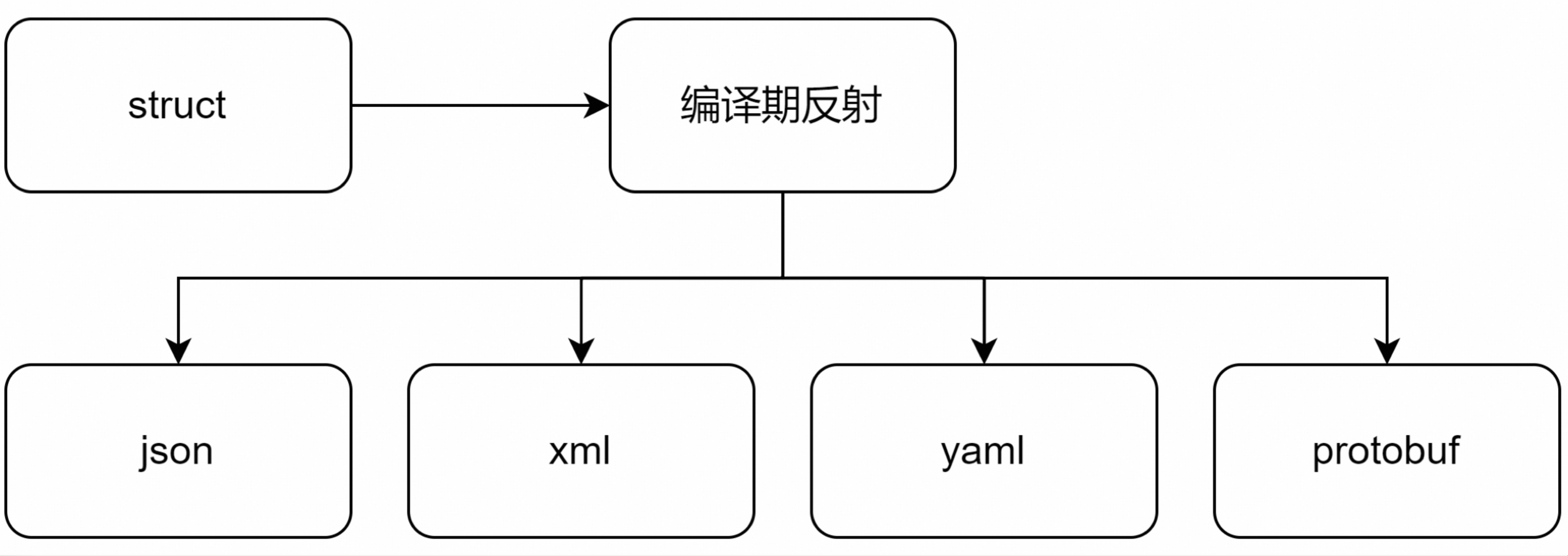
如何在实际开发中深入使用 yalantinglibs 编译期反射库
点击开启一场奇妙的编译期反射之旅。
yaLanTingLibs 是阿里云开源的现代 C++ 基础工具库的集合,包括序列化、http、rpc、协程、编译期反射、metric 和日志等库,可以帮助 C++ 开发者快速构建高性能的 C++ 应用。2024 云栖大会操作系统技术 Workshop 上,阿里云智能集团高级技术专家、purecpp社区负责人、《深入应用C++11》作者祁宇分享了《深入应用C++20编译期反射》,本文将重点介绍 yaLanTingLibs 编译期反射库,通过一些案例介绍其应用场景、功能和特色,以及如何将它用于实际开发。
本文的例子推荐安装龙蜥操作系统的 Alibaba Cloud Compiler 编译器编译,安装方法见链接:安装并使用Alibaba Cloud Compiler构建高性能的C++应用_Alibaba Cloud Linux(Alinux)-阿里云帮助中心

(图/阿里云智能集团高级技术专家、purecpp社区负责人、《深入应用C++11》作者祁宇)
编译期反射一个对象
首先,从一个简单的例子开始:
#include "ylt/reflection/member_value.hpp"
struct simple {
int color;
int id;
std::string str;
int age;
};
int main() {
using namespace ylt::reflection;
// 编译期获取simple 字段个数
static_assert(member_count_v<simple> == 4);
// 编译期获取simple 类型的名称
static_assert(get_struct_name<simple>() == "simple");
// 编译期获取simple 字段名称列表
static_assert(get_member_names<simple>() == std::array<std::string_view, 4>{"color", "id", "str", "age"});
// 根据类型遍历其字段名和索引
for_each<simple>([](std::string_view field_name) {
std::cout << field_name << "\n";
});
for_each<simple>([](std::string_view field_name, size_t index) {
std::cout << index << ", " << field_name << "\n";
});
}
除了获取这些最基本的对象元数据的 API 之外,ylt::reflection 还提供了更多有用的 API:
int main() {
simple p{.color = 2, .id = 10, .str = "hello reflection", .age = 6};
// 通过编译期索引获取字段值
CHECK(std::get<0>(p) == 2);
CHECK(std::get<2>(p) == "hello reflection");
// 根据编译期索引获取字段名
static_assert(name_of<simple, 1>()== "id");
// 根据编译期字段名获取字段值
CHECK(get<"age"_ylts>(p) == 6);
CHECK(get<"str"_ylts>(p) == "hello reflection");
// 根据编译期字段名获取字段索引
static_assert(index_of<simple2, "str"_ylts>() == 2);
// 遍历对象的字段、字段名、字段索引, 并打印
for_each(p, [](auto& field, auto name, auto index) {
std::cout << field << ", " << name << ", " << index << "\n";
});
// 访问对象的所有字段值
visit_members(p, [](auto&&... args) {
((std::cout << args << " "), ...);
std::cout << "\n";
});
}
有了这些编译期反射的 API 之后就可以做一些有趣的事了,比如做序列化,理论上可以通过编译期反射将一个对象序列化到任意格式。事实上 yalantinglibs 也是这样做的,通过统一的编译期反射 API 将对象转换为 json,xml,yaml,protobuf 等格式。

基于编译期反射的序列化
基于 yalantinglibs 反射库可以非侵入式的将一个对象序列化到多种数据格式,也可以扩展支持自定义的格式。
#include "ylt/struct_json/json_reader.h"
#include "ylt/struct_json/json_writer.h"
#include "ylt/struct_xml/xml_reader.h"
#include "ylt/struct_xml/xml_writer.h"
#include "ylt/struct_yaml/yaml_reader.h"
#include "ylt/struct_yaml/yaml_writer.h"
#include "ylt/struct_pb.hpp"
struct simple {
int color;
int id;
std::string str;
int age;
};
int main() {
simple p{.color = 2, .id = 10, .str = "hello reflection", .age = 6};
std::string json;
struct_json::to_json(p, json);
std::string xml;
struct_xml::to_xml(p, xml);
std::string yaml;
struct_yaml::to_yaml(p, yaml);
std::string protobuf;
struct_pb::to_pb(p, protobuf);
simple p1;
struct_json::from_json(p1, json);
struct_xml::from_xml(p1, xml);
struct_yaml::from_yaml(p1, xml);
struct_pb::from_pb(p1, xml);
}
使用yalantinglibs reflection库实现自定义格式的序列化
使用 yalantinglibs reflection 库可以很方便的将对象序列化到自定义格式,比如将一个对象序列化成一个简单的 json5 格式,json5 的 key 是没有引号的。
只需要通过反射 API for_each 拿到对象的字段值和字段名就够了。
struct point {
int x;
int y;
};
void test_json5() {
point pt{2, 4};
std::string json5;
json5.append("{");
ylt::reflection::for_each(pt, [&](auto& field, auto name) {
json5.append(name).append(":").append(std::to_string(field)).append(",");
});
json5.back() = '}';
CHECK(json5 == "{x:2,y:4}");
}低版本编译器的支持
上述中的 example 只能在 C++20 高版本编译器(clang13+, gcc11+, msvc2022)中才能编译运行。如果编译器版本较低只支持 C++17 能用 yalantinglibs 的反射库吗?
答案也是肯定的,yalantinglibs 的反射库兼容了 C++17,支持的最低版本是 gcc9,不过需要宏定义一个额外的宏才能使用反射 API(C++20 高版本编译器中是不需宏的),比如之前的例子:
struct simple {
int color;
int id;
std::string str;
int age;
};
YLT_REFL(simple, color, id, str, age);
int main() {
using namespace ylt::reflection;
// 编译期获取simple 字段个数
static_assert(member_count_v<simple> == 4);
// 编译期获取simple 类型的名称
static_assert(get_struct_name<simple>() == "simple");
// 编译期获取simple 字段名称列表
static_assert(get_member_names<simple>() == std::array<std::string_view, 4>{"color", "id", "str", "age"});
// 根据类型遍历其字段名和索引
for_each<simple>([](std::string_view field_name, size_t index) {
std::cout << index << ", " << field_name << "\n";
});
}
定义了 YLT_REFL 宏之后就可以使用反射的 API 了,如果对象的字段都是私有的,则需要将宏定义到对象内部:
struct simple {
YLT_REFL(simple, color, id, str, age);
private:
int color;
int id;
std::string str;
int age;
};
这种方式可以反射私有字段但有侵入性,如果对象有 public 的访问私有字段的方法也可做到非侵入式:
struct dummy_t5 {
private:
int id = 42;
std::string name = "tom";
int age = 20;
public:
int& get_id() { return id; }
std::string& get_name() { return name; }
int& get_age() { return age; }
const int& get_id() const { return id; }
const std::string& get_name() const { return name; }
const int& get_age() const { return age; }
};
YLT_REFL(dummy_t5, get_id(), get_name(), get_age());
如果对象字段都是私有的,并且没有提供 public 的访问方法还能反射吗?也是可以的,可以通过 yalantinglibs reflection 另外一个宏 YLT_REFL_PRIVATE 非侵入式的反射对象的私有字段:
class private_struct {
int a;
int b;
public:
private_struct(int x, int y) : a(x), b(y) {}
};
YLT_REFL_PRIVATE(private_struct, a, b);
现在就可以反射对象的私有字段了:
private_struct st(2, 4);
for_each(st, [](auto& field, auto name, auto index){
std::cout << field << ", " << name << ", " << index << "\n";
});
visit_members(st, [](auto&... args) {
((std::cout << args << " "), ...);
std::cout << "\n";
}); 总结
编译期反射的应用场景很广泛,非常适合用在序列化场景、ORM(实体-映射)场景、非侵入式访问对象等场景,yalantinglibs 的反射库在支持 C++20 的同时也兼容了 C++17,不论是低版本编译器还是高版本编译器,或者对象存在私有字段等场景,都能使用统一的一套易用的 API。
—— 完 ——
更多推荐
 已为社区贡献546条内容
已为社区贡献546条内容










所有评论(0)